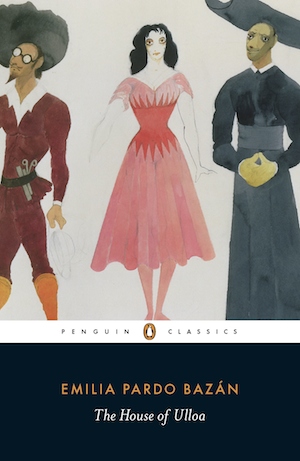I cannot recommend this Spanish classic highly enough. The House of Ulloa is funny, clever, progressive and colourful, written by the feisty and daring Emilia Prado Bazán in 1886 and, luckily, reissued in English recently. We meet the gentle, devout chaplain Julián who’s been asked by Don Manuel, a prominent noble, to clean up the sinful House of Ulloa, the country estate of his unruly nephew, Don Pedro. This hilarious meeting of polar opposites takes place amidst magnificently described Galician landscapes and decrepit aristocratic homes.
Julián arrives at the remote estate and finds a house in physical and moral collapse: a housekeeper who doubles as the marquis’ mistress, an illegitimate, wine drinking four-year-old child who lives alongside the animals, and a dark, manipulative estate manager with sinister intentions.
Julián brings Don Pedro to his uncle’s house in Santiago de Compostela, hoping that city life will have a civilising influence. Seeing an opportunity to find a wife and better his financial position, Don Pedro marries Nucha, the least attractive, but most affluent of his four cousins and, in Julián’s view, the ‘ideal model of a biblical wife’.
It’s not exactly a match made in heaven and soon the marquis is back to his old ways: drinking, shooting and sleeping around. Nucha descends into deep depression and the shameless sinning all round is starting to wear on Julián’s nerves. But our hapless hero is an indecisive character incapable of taking action and tragedy follows.
Prado Bazán vividly portrays an aristocracy in decline, their crumbling estates with ‘open-work’ roofs through which one could see ‘strips of sky-blue velvet’ and stairs with ‘worm eaten steps’ evoking ‘that inexplicable sadness […] when one witnesses something coming to its inevitable end.’
The House of Ulloa is first-class story telling which overflows with superbly written descriptions of people and places.
Had a master of the Flemish school been present, one of those painters who poured the poetry of art over the prose of domestic life, with what pleasure he would have observed the spectacle of the big kitchen: the beautiful liveliness of the log-fire, caressing the pan’s bright belly; the housekeeper’s plump arms, indistinguishable from the round blood-red piece of meat she was preparing for the oven; the pink cheeks of the wenches, who were busy frolicking with the idiot, like nymphs with a helpless satyr, throwing handfuls of rice and peppers down the inside of his shirt.
What really struck me about this book is how progressive it must have been when it was published and how raunchy and free-spirited Pardo Bazán allowed herself to be. Remember, this is a female author in a strictly Catholic country at the end of the 19th century. She challenges misogyny, ridicules the aristocracy (to which she herself belonged), the church and local politics. The House of Ulloa is awash with quotable, often satirical, nuggets of wisdom aimed at the establishment.
Christian matrimony – the blessed knot by means of which the Church takes care, with admirable wisdom, of both man’s material and spiritual needs, sanctifying the first of these with the second.
What a brilliant way to describe marriage!
The House of Ulloa by Emilia Pardo Bazán is published by Penguin Books, 256 pages (make sure you pick up the version translated by Lucia Graves and Paul O’Prey).





